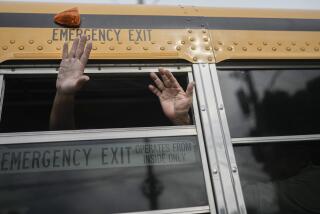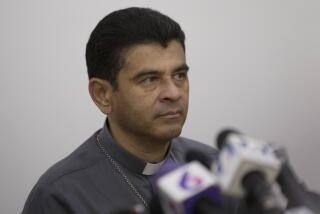Contras Will Disband, Says Archbishop
TEGUCIGALPA, Honduras — Nicaragua’s Contras agreed Friday to begin disbanding their troops in Honduras by April 20, five days before a new civilian government is to take over in Nicaragua.
Cardinal Miguel Obando y Bravo, the archbishop of Managua, announced the agreement after a seven-hour meeting with leaders of the Nicaraguan Resistance and representatives of President-elect Violeta Barrios de Chamorro.
The communique said the U.S.-backed rebels agreed to demobilize the 10,000 fighters in bases in Yamales, Honduras, near the Nicaraguan border. It said the 3,000 guerrillas inside Nicaragua would move into security zones supervised by Obando y Bravo and the United Nations.
Chamorro’s conservative, pro-American coalition defeated the leftist Sandinistas in the election, which was monitored by several thousand international observers.
The communique said the rebels agreed to demobilize because the Feb. 25 elections had “established a process of democratization” in Nicaragua. It did not mention when the disbanding would be completed.
The rebels called for an immediate cease-fire between the Sandinista armed forces and the Contras inside Nicaragua to be supervised by the United Nations and Obando y Bravo.
Chamorro’s delegation to the talks agreed that the new administration would provide pensions to Contra widows and orphans and to wounded rebel veterans in “recognition of their patriotic labors.” No details were immediately available.
The Chamorro administration also promised to “assure the rehabilitation and social readaptation” of those affected by the war and to seek humanitarian and medical aid for the duration of the demobilization.
Leaders of the rebels met with Obando y Bravo and Chamorro’s representatives had come to Honduras to persuade the rebels to disband before her April 25 inauguration.
“In Central America, the time has come for arms to be silenced to make way for the search for a lasting regional peace,” Obando y Bravo said before talks began at Toncontin air base outside the capital.
“The size of the armies also should be reduced for the purpose of seeking civilized solutions to the serious problems that afflict the great Central American nation.”
Nicaraguan President Daniel Ortega said he fully supports the agreement to begin disbanding the Contras.
“As president of Nicaragua I fully support this accord. I believe it goes in the direction of achieving peace and eliminating the war that has caused so much suffering, so much harm to the Nicaraguan people,” he told reporters at the Managua airport, where he met representatives of the church and the new government.
President Bush, who said the Contras must disband, has asked Congress to approve a $300-million aid package for Nicaragua that includes $45 million to demobilize and relocate the Contras and 42,000 relatives living in the base camp in Yamales, Honduras.
The Chamorro delegation also agreed to set up a commission including representatives of the new government and of the Contras to monitor demobilization. The commission and humanitarian aid for the rebels and their families were conditions the Contras set for demobilization at the outset of Friday’s talks.
The rebels went into the talks with a long list of demands, including several--such as the demobilization of the Sandinista army--that would have required the agreement of the Sandinistas. The Sandinistas were not represented at the talks.
Other rebel demands that were not part of the agreement:
* The right to reclaim or receive compensation for property confiscated by the Sandinista government.
* Rebel participation in the National Reconciliation Commission, a multi-sector commission created under the Central American peace plan, and in a national agency to manage funds for the demobilization.
* Tax exemptions for repatriated rebels for the first year of the new government.
* A national referendum on modifying the structure of the armed forces
Israel Galeano, the rebels’ top leader, led their five-member military delegation. Three members of the rebels’ political commission, led by Aristides Sanchez, also participated.
Chamorro representatives included her chief negotiator, Antonio Lacayo, and Emilio Alvarez, considered her closest adviser and a likely choice to be her foreign minister.
More to Read
Sign up for Essential California
The most important California stories and recommendations in your inbox every morning.
You may occasionally receive promotional content from the Los Angeles Times.










